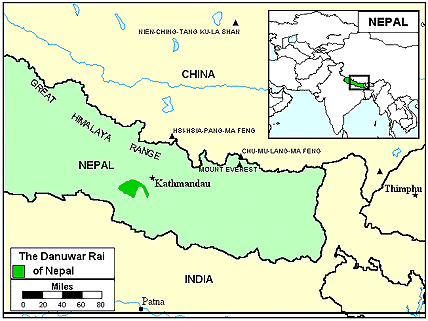|
|
Prayer Profile
The Danuwar Rai of Nepal
![[IMAGE]](../images2/0391.jpg) The small independent kingdom of Nepal is located along the southern slopes of the Himalayas, between India and Tibet. It is home to approximately 110 different tribal groups, each one with its own cultural distinctions. The country is primarily agricultural, and most of the population is dependent upon farming for survival. Unfortunately, it is still poor and undeveloped.
The small independent kingdom of Nepal is located along the southern slopes of the Himalayas, between India and Tibet. It is home to approximately 110 different tribal groups, each one with its own cultural distinctions. The country is primarily agricultural, and most of the population is dependent upon farming for survival. Unfortunately, it is still poor and undeveloped.
The Danuwar Rai belong to a cluster of people known as the Rai, the largest ethnic group in eastern Nepal. Each of the Rai groups speaks a different dialect and has its own religious beliefs. Their languages have transformed from the original language to a mixture of local dialects, from which most take their names.
Although their facial features are somewhat Mongoloid, the Danuwar claim no relation to the Mongolian race. They believe that they are descendants of the goddesses Marema, Mahadeva, and Nina, (daughter of the earth).
What are their lives like?
The Danuwar Rai are primarily rice farmers. Unfortunately, they have been limited by insufficient knowledge of technology, causing a poor yield in crops. They farm rice in the low-lying areas, and raise potatoes, maize, wheat, and barley at higher altitudes. The men are responsible for plowing the fields, while the women take care of planting the seeds. Families often unite to help each other at harvest time. Farmers trade any surplus crops they may have for needed items such as kerosene and salt. Others supplement their meager incomes through craftwork and tailoring.
The Danuwar Rai typically live in stone or wooden houses made with thatched roofs. The houses usually have wooden porches around the outside.
Collectively, the Rai are known as very courageous, daring, and fearless people. In recent history, they have won worldwide respect for their bravery in the Royal Nepalese Army. Joining the army is often a way out of enduring economic hardship. It also brings respect and honor, especially for those of high military rank.
Among the Rai, weddings are very festive occasions. Some marriages are facilitated by kongpi, or middlemen, who work out the details of the marriage. Gifts are presented to the families; and if accepted, a marriage date will be set. Other marriages are facilitated by the "arranged kidnapping" of the girl of one's choice. Many believe that this method brings about good results.
At the wedding, gifts are given to the parents of the bride and groom, as well as to a long line of family members and village elders. The sacrifice of an animal, usually a pig or rooster, may also be performed at this time. Meat and drinks are served in abundance. One favorite beverage is made from barley and potatoes. Often the whole night is spent in singing and celebration.
What are their needs?
Ninety percent of Nepal's population (including the royal family) is Hindu. However, Hinduism and Buddhism exist side by side and are somewhat intermingled.
The majority of Danuwar Rai are Hindus; but there are also a number of Buddhists and some animists (believe that non-human objects have spirits). They believe in a host of local spirits and supernatural forces. This mixture has created a wide variety of gods and worship practices among them.
What are their needs?
Nepal has long been hidden away and forgotten by most of the world. The government is fiercely opposed to any form of evangelization, and has restricted the spreading of the Gospel. The penalties for sharing Christianity have been harsh. Many believers have spent time in prison for their beliefs.
Illiteracy ranks as one of the country's most serious problems. Perhaps Christians might find open doors into Nepal as teachers.
The Danuwar Rai have neither the Bible nor the Jesus film in their language. Currently, there is one missions agency targeting them; however, there are still only 190 known Danuwar believers.
Prayer Points
- Pray against the spirits of Hinduism and ethnic religions that are keeping the Danuwar Rai bound.
- Ask God to call out prayer teams to go and break up the soil through worship and intercession.
- Pray that the Lord of the harvest will raise up long-term laborers to live and work among the Rai.
- Ask the Holy Spirit to complete the work begun in the hearts of the few Danuwar believers through adequate discipleship.
- Pray that God will raise up qualified linguists to translate the Bible into the Dhanwar language.
- Pray for the speedy completion of the Jesus film and other evangelistic materials into the Dhanwar language.
- Ask the Holy Spirit to open the hearts of Nepal's governmental leaders to the Gospel.
- Ask the Lord to raise up a triumphant Church among the Danuwar Rai for the glory of His name!

Statistics
Latest estimates from the World Evangelization Research Center.
THE PEOPLE
- People name: Danuwar Rai
- Country: Nepal
- Their language: Dhanwar
- Population:
- Largest religion:
- Christians: 1%
- Church members: 190
- Scriptures in their own language: None
- Jesus Film in their own language: None
- Christian broadcasts in their own language: None
- Mission agencies working among this people: 1
- Persons who have heard the Gospel: 3,400 (18%)
- Persons who have never heard the Gospel: 15,600 (82%)
THEIR COUNTRY
- Country: Nepal
- Population:
- Major peoples in size order:
- Major religions:
- Number of denominations: 27
© Copyright 1997
Bethany World Prayer Center
This profile may be copied and distributed without obtaining permission
as long as it is not altered, bound, published
or used for profit purposes.
![[HOME BUTTON]](../graphics/home.jpg)
![[CALENDAR BUTTON]](../graphics/calico.jpg)
![[LIST BUTTON]](../graphics/listico.jpg)
[Home]
[Calendar]
[Country List]
|